Your cart is currently empty!
Stomach cramps, bloating, diarrhea, oh my! These may sound like the symptoms of a stomach bug, but for the 45 million Americans who struggle with IBS, they are a common part of daily life.
Irritable Bowel Syndrome (IBS) is more than just occasional digestive discomfort. It is a chronic condition that can significantly impact your quality of life – that is, until you find a way to restore healthy digestive balance.
While Western medicine typically treats IBS symptoms with dietary changes and medications, Chinese herbal medicine offers a powerful natural ally to stop your symptoms (and emergency runs to the bathroom).
Read on to find out how the best Chinese herbs for IBS can help you feel comfortable and confident in your digestive health.
What is IBS?
Irritable Bowel Syndrome (IBS) is a complex and often misunderstood or misdiagnosed chronic digestive condition. It primarily affects the large intestine, which can lead to a range of uncomfortable symptoms. The most common? Belly discomfort or pain and trouble with bowel habits: either going more or less often than normal (diarrhea or constipation) or having different kinds of stool (thin, hard, or soft and liquid).
IBS is more common in women than in men and typically diagnosed before reaching 50 years of age. Unlike other gastrointestinal disorders, IBS doesn’t cause changes in bowel tissue or increase your risk of colorectal cancer. However, it’s a long-term condition that needs to be managed over time or will significantly interfere with daily life.
Symptoms of IBS
Living with IBS can be particularly challenging because the symptoms can be unpredictable and impact emotional well-being, making it a difficult condition to manage without proper treatment. But, knowing what symptoms to look for is the first step to getting the best support you need to heal your gut:
- Abdominal pain (often relieved after a bowel movement)
- Diarrhea, constipation, or a combination of both
- Extreme and sudden urge to use the bathroom
- Bloating and gas
- Food intolerances or sensitivities to certain foods
- Fatigue and difficulty sleeping
What Causes IBS?
Researchers are still determining the exact cause of IBS, but here’s what we do know: IBS likely develops in response to not just one issue, but a combination of factors.
- Gut-Brain Axis Disturbances
Miscommunications between the brain and the intestines can cause the body to overreact to normal digestive processes and cause pain, diarrhea, or constipation. - Gastrointestinal Motor Problems
When the GI tract doesn’t move normally (too fast or too spasmodic), this can lead to IBS symptoms and cause either constipation or diarrhea. - Visceral Hypersensitivity
Those with IBS may have an increased nervous system response or sensitivity to abdominal pain or discomfort. - Intestinal Infections
Some people develop IBS after a severe bout of diarrhea caused by bacteria or a virus. - Food Sensitivities
Sensitivities to certain foods can trigger IBS symptoms without causing a full allergic or immune response. - Genetics
IBS may be passed down through genetics, meaning a family history of IBS may increase the risk of developing the condition. - Psychological Factors
The gut-brain connection is strong. Stress and emotional triggers are often linked to the development of IBS, or the worsening of existing symptoms.
Western and Conventional Treatment for IBS
Western medicine tackles Irritable Bowel Syndrome by focusing on easing the symptoms to make life more comfortable for those dealing with it.
This approach usually combines changes in diet, medication, and sometimes mental health support. Doctors often advise eating more fiber or trying a special diet called low-FODMAP to figure out which foods might be causing trouble.
Depending on the main symptoms, different medications are used, like laxatives for hard stools, medicine to stop diarrhea, and drugs to ease stomach pain. If stress or emotional issues seem to make IBS worse, treatments such as talking therapies or relaxation techniques may be suggested.
While this approach can help keep symptoms at bay, they don’t always address the root cause of IBS. That’s where Traditional Chinese Medicine (TCM) comes in. With TCM, we can work on rebalancing the underlying imbalances in the body’s energy that led to the development of IBS and digestive distress so we stop symptoms from happening (instead of simply quieting them). Let’s take a closer look.
IBS in Traditional Chinese Medicine
To understand how TCM works for issues like IBS, it’s important to understand how disease itself is viewed in Chinese medicine.
Unlike Western medicine, Traditional Chinese Medicine (TCM) does not treat IBS as a single disease. Instead, TCM considers IBS to be a manifestation of underlying imbalances within the body that cause symptoms (like abdominal pain or diarrhea). By identifying and correcting these imbalances, TCM aims to alleviate IBS symptoms.
A successful treatment relies on an accurate diagnosis of the core imbalance. So, how can you know which “type” of IBS you have? Observing your whole-body health, digestive and other symptoms, and common tendencies can help you determine your unique pattern of imbalance. Here are some common TCM patterns associated with IBS:
- Spleen Qi Deficiency
This pattern is characterized by symptoms such as fatigue, loose stools, and abdominal bloating. The spleen in TCM is responsible for digestion and absorption of nutrients, and a deficiency can lead to poor digestion and bowel irregularities. - Liver Qi Stagnation
If you’re struggling with Liver Qi Stagnation-type IBS, you may experience irregular bowel movements (alternative constipation and diarrhea), abdominal pain, and emotional symptoms such as frustration or irritability. This pattern is believed to result from stress or emotional upset disrupting the flow of Qi (energy) in the body. - Damp Heat in the Large Intestine
Damp-heat is a pattern that is associated with an imbalance of heat and moisture in the digestive tract. It typically manifests as symptoms like urgent bowel movements, foul-smelling stool, pain, inflammation, and sometimes fever. - Yin Deficiency
Yin is the cooling, nutritive aspect of the body. When Yin is too low, this pattern can lead to symptoms such as dry stools, frequent thirst, and a sensation of heat.
The Best Chinese Herbs for IBS Relief
TCM offers a natural approach to managing IBS through the use of herbal formulas that aim to correct the underlying imbalances identified in the diagnosis. Let’s revisit those common imbalances and find the best formula to restore digestive – and whole-body – health.
-
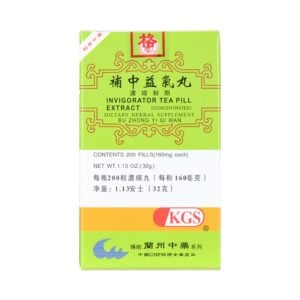 Bu Zhong Yi Qi Wan – Invigorator Teapill Extract – Kingsway (KGS) Brand
Starting at $6.99
Add to CartSelect options
This product has multiple variants. The options may be chosen on the product page
Bu Zhong Yi Qi Wan – Invigorator Teapill Extract – Kingsway (KGS) Brand
Starting at $6.99
Add to CartSelect options
This product has multiple variants. The options may be chosen on the product page
For Spleen Qi Deficiency: Bu Zhong Yi Qi Wan
Low energy, loose stools, pale or sallow complexion.
When Spleen qi is limited, the body doesn’t have enough energy to properly digest food. As a result, issues like diarrhea, loose stools, nausea, bloating, and fatigue are common. Bu Zhong Yi Qi Wan works to strengthen the Spleen from the root, which enhances digestive health and regulates bowel movements. This formula can also help boost natural energy levels and mood.
For Liver Qi Stagnation: Chai Hu Shu Gan Wan
Alternating constipation/diarrhea, abdominal cramps, irritability.
In TCM, the Liver is in charge of maintaining the smooth flow of qi and blood through the body. But, it is also susceptible to blockages and stagnation. When this happens, the body’s natural processes – especially digestion – can be thrown off balance. This is why those with Liver Qi Stagnation-type IBS often struggle with constipation and diarrhea; the body is operating in stop-and-go mode due to the uneven flow of Qi. Chai Hu Shu Gan Wan helps by soothing the Liver, promoting the smooth flow of Qi, and alleviating abdominal discomfort.
For Damp Heat in the Large Intestine: Curing Pills
Abdominal discomfort, diarrhea, symptoms of heat.
Damp heat in the Large Intestine can lead to pain, cramping, diarrhea, gas, and foul-smelling stool. To help, a formula like Curing Pills can clear the heat, eliminate dampness, and relieve inflammation in the digestive tract. Once the damp-heat has resolved, however, it’s important to restore the body’s digestive energy through Spleen-boosting, dampness-preventing formulas like Liu Jun Zi Wan.
For Yin Deficiency: Liu Wei Di Huang Wan
Constipation, dry stools, symptoms of heat and dryness.
If your IBS tends to constipation, slow stools, and dryness, you are likely dealing with a Yin deficiency. To help, restore your body’s natural source of nourishing Yin with a classic formula like Liu Wei Di Huang Wan. This formula works to moisturize the intestines, alleviate dry stools, and ease IBS discomfort.
Formulas for IBS Symptom Management
While most TCM formulas aim to get to the root of IBS, some can help in the short term with natural symptom management. Here are a few symptom-focused formulas to keep on hand to manage IBS flares:
For Painful Bowel Movements: Tong Xie Yao Feng Wan
Calm Wind Teapills, or Tong Xie Yao Fang Wan, is one of the most effective formulas for reducing painful diarrhea, straining during bowel movements, abdominal cramps, and general symptoms of Irritable Bowel Syndrome.
For Constipation: Ma Zi Ren Wan
For those with constipation due to Yin deficiency and dryness, Ma Zi Ren Wan helps make bowel movements more frequent and comfortable. This formula moistens the intestines and helps to move the stool through the digestive tract more easily and painlessly.
-
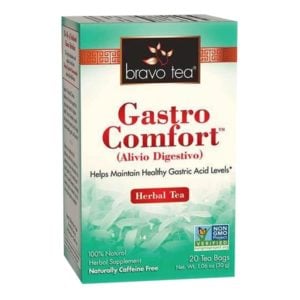 Gastro Comfort Tea – by Bravo Tea
Starting at $6.99
Add to CartSelect options
This product has multiple variants. The options may be chosen on the product page
Gastro Comfort Tea – by Bravo Tea
Starting at $6.99
Add to CartSelect options
This product has multiple variants. The options may be chosen on the product page
For Overall IBS Support: Gastro Comfort Tea
Gastro Comfort Tea is an herbal tea that provides relief from digestive discomfort and promotes gastrointestinal well-being. This tea contains a blend of herbs that are believed to have soothing, digestive-supportive, and anti-inflammatory properties that help alleviate the symptoms associated with IBS.
Diet and Lifestyle Recommendations in TCM for IBS
Healthy habits can make a huge impact on your health no matter what you’re struggling with. But, when it comes to digestive issues like IBS, diet and lifestyle habits are non-negotiable self-care practices that can significantly improve your health and speed up your recovery. Here are some general TCM-inspired lifestyle tips for those with IBS:
- Practice Mindful Eating
Mindful eating is a simple way to improve digestion, reduce tension, and promote whole-body health. Simply by chewing your food slowly and thoroughly, you can help support your body’s best digestion and absorption. Eating in a calm and relaxed environment can also help reduce stress levels that may exacerbate IBS symptoms. - Enjoy a Balanced Diet
Incorporate a balanced, nutrient-rich diet that supports the Spleen and Stomach, the organs of digestion in TCM. These organ systems prefer warm, cooked whole foods that are easy to digest and full of nutrients (like cooked whole grains and vegetables). It’s also important to avoid cold, raw foods that can strain the digestive system. - Get Moving with Regular Exercise
Engage in regular, gentle exercise such as walking, Tai Chi, or Qi Gong. These practices not only improve physical health but also promote the flow of Qi throughout the body, which helps alleviate stress and improves digestion. - Get Stress Under Control
Since stress can significantly impact digestion and exacerbate IBS symptoms, finding effective ways to manage stress is crucial for restoring balance. Techniques such as meditation, yoga, and deep-breathing exercises can help calm the mind and reduce the impact of stress on the body. - Sleep Well
Sleep is essential for all body processes – especially digestion and healing. Without enough sleep, you can trigger stress, irritability, inflammation, and worsen your IBS symptoms. Aim to go to bed an hour earlier than you normally do and adopt a tech-free bedtime routine.
Heal IBS from the Root with Chinese Herbal Medicine
IBS is at best an uncomfortable annoyance and at worst a debilitating disease. With the help of Chinese herbs and other natural therapies, you can restore your body’s balance and heal your IBS symptoms.
Shop our full collection of digestion-harmonizing formulas here, or learn more about addressing symptoms like constipation, inflammatory conditions, or gut health!
Table of Contents
- What is IBS?
- IBS in Traditional Chinese Medicine
- Heal IBS from the Root with Chinese Herbal Medicine
About the Author
Blog Categories
- Adaptogen Articles (7)
- Brain Health Articles (9)
- Chinese Medicine Basics Articles (10)
- Chinese Medicine for Pain Articles (13)
- Chinese Medicine for Pets Articles (3)
- Chinese Medicine for Skin Conditions Articles (6)
- Chinese Medicine Formula Articles (6)
- Chinese Medicine Sleep Articles (4)
- Conditions & Concerns Articles (17)
- Digestive Issues (5)
- Health & Lifestyle Articles (17)
- Heart Health Articles (4)
- In the News (1)
- Medicinal Mushrooms Articles (7)
- Men's Health Articles (4)
- Scholarships (5)
- Uncategorized Articles (9)
- Weight Loss, Diet & Obesity Articles (5)
- Women's Health Articles (9)
Articles Related To The Best Chinese Herbs for Irritable Bowel Syndrome (IBS)
-
From a nagging tickle in your throat to a painful hack, coughing can be an uncomfortable and annoying symptom. But before you reach for the drugstore cough medicine, Chinese herbs for cough may offer faster relief and longer-lasting benefits. In Traditional Chinese Medicine (TCM), coughing is often seen as a sign of an imbalance in…
-
These days, trying to stay on top of a successful career, a clean home, a vibrant social life, and healthy habits can feel impossible. We burn the candle at both ends to try to have it all, which leaves many of us feeling burned out. As a result, conditions like adrenal fatigue are skyrocketing. Feeling…
-
Gout, a painful form of arthritis, is becoming increasingly common worldwide. In fact, over 8.3 million Americans suffer from this burning toe pain every year. Thankfully, Chinese herbs for gout offer a safe and natural way to ease the pain. The usual treatments for gout often involve medications, which can have side effects and don’t…
-
According to the American Institute of Stress, 94% of Americans claim to experience chronic stress. Can Chinese herbs for stress help with this overwhelming epidemic? From work deadlines to family commitments to financial challenges, stress seeps into our daily lives from all angles. While triggers can span from mild issues like your traffic-heavy commute to…
-
When pain, infections, or chronic diseases start to interfere with your daily life, it’s time to try Chinese herbs for inflammation. Inflammation is at the root of many health issues. While inflammation is meant to help the body overcome illness and fight disease, too much inflammation can harm the body and prevent healing. Here you’ll…


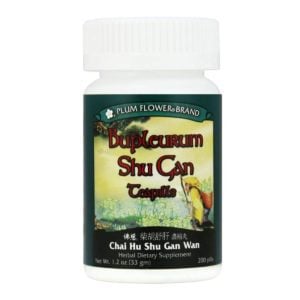 Plum Flower – Bupleurum Shu Gan (Chai Hu Shu Gan Wan)
Plum Flower – Bupleurum Shu Gan (Chai Hu Shu Gan Wan)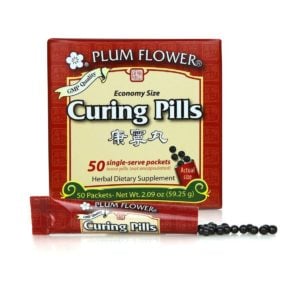 Plum Flower – Curing Pills (Kang Ning Wan)
Plum Flower – Curing Pills (Kang Ning Wan)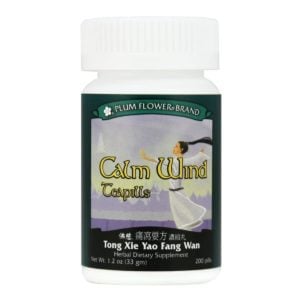 Plum Flower – Calm Wind (Tong Xie Yao Fang Wan)
Plum Flower – Calm Wind (Tong Xie Yao Fang Wan) Plum Flower – Ma Zi Ren
Plum Flower – Ma Zi Ren